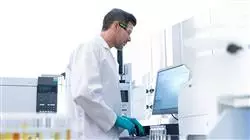University certificate
Accreditation/Membership
The world's largest faculty of engineering”
Introduction to the Program
Thanks to this Master's Degree, you will analyze how artificial intelligence influences pattern recognition in medical images”

The Master's Degree in E-Health and Big Data aims to transmit the multiple benefits of technology in medicine. The concept of e-Health is defined by the World Health Organization (WHO) as: the cost-effective and safe use of information and communication technologies in support of health and public health related fields, including healthcare, health surveillance and health education, knowledge and research. Developments in this field make it possible, for example, to diagnose diseases thanks to hospital databases, or even to insert new 3D-printed limbs into human and animal bodies.
The imminent evolution of medicine requires highly qualified professionals who know how to respond to the needs of Industry 4.0. TECH aims to boost the careers of engineers who wish to delve into healthcare service and are interested in the simultaneous development of telemedicine. This Master's Degree addresses the theoretical and practical foundations of modern medicine to generate a global and deep vision of the new additions in biomedicine.
Students will not only delve into aspects of E-Health and Big Data, but will also learn about how the international healthcare system operates and is organized. Likewise, this program offers a focus on the entrepreneurship sector that positions engineering graduates as the target audience of this digital education, encouraging the creation of their own companies with the keys to business innovation.
TECH will participate in the expansion of these studies through a Master's Degree based on the knowledge of scientists in the field, especially those involved in artificial intelligence projects. The teaching staff will be available to students 24 hours a day and will monitor their studies. What is more, the 100% online format and the audiovisual content will facilitate student training and study
Distinguish yourself in a booming sector and join what is considered to be the technological solution of the future in medical development”
This Master's Degree in E-Health and Big Data contains the most complete and up-to-date program on the market. The most important features include:
- Practical cases presented by experts in Information and Communication Technology focused on the healthcare services
- The graphic, schematic, and practical contents with which they are created, provide scientific and practical information on the disciplines that are essential for professional practice
- Practical exercises where self-assessment can be used to improve learning
- Its special emphasis on innovative methodologies
- Theoretical lessons, questions to the expert, debate forums on controversial topics, and individual reflection assignments
- Content that is accessible from any fixed or portable device with an Internet connection
Join the change in modern medicine by applying artificial intelligence and the internet of things (IoT) to telemedicine”
The program’s teaching staff includes professionals from the sector who contribute their work experience to this educational program, as well as renowned specialists from leading societies and prestigious universities.
Its multimedia content, developed with the latest educational technology, will allow the professional a situated and contextual learning, that is, a simulated environment that will provide an immersive education programmed to prepare in real situations.
This program is designed around Problem-Based Learning, whereby the professional must try to solve the different professional practice situations that arise during the course. For this purpose, the student will be assisted by an innovative interactive video system created by renowned and experienced experts.
Boost your career projection thanks to bioinformatics computing and Big Data techniques"

Update your biomedical knowledge thanks to new tools used in clinical health management"
Why study at TECH?
TECH is the world’s largest online university. With an impressive catalog of more than 14,000 university programs available in 11 languages, it is positioned as a leader in employability, with a 99% job placement rate. In addition, it relies on an enormous faculty of more than 6,000 professors of the highest international renown.

Study at the world's largest online university and guarantee your professional success. The future starts at TECH”
The world’s best online university according to FORBES
The prestigious Forbes magazine, specialized in business and finance, has highlighted TECH as “the world's best online university” This is what they have recently stated in an article in their digital edition in which they echo the success story of this institution, “thanks to the academic offer it provides, the selection of its teaching staff, and an innovative learning method aimed at educating the professionals of the future”
A revolutionary study method, a cutting-edge faculty and a practical focus: the key to TECH's success.
The most complete study plans on the university scene
TECH offers the most complete study plans on the university scene, with syllabuses that cover fundamental concepts and, at the same time, the main scientific advances in their specific scientific areas. In addition, these programs are continuously being updated to guarantee students the academic vanguard and the most in-demand professional skills. In this way, the university's qualifications provide its graduates with a significant advantage to propel their careers to success.
TECH offers the most comprehensive and intensive study plans on the current university scene.
A world-class teaching staff
TECH's teaching staff is made up of more than 6,000 professors with the highest international recognition. Professors, researchers and top executives of multinational companies, including Isaiah Covington, performance coach of the Boston Celtics; Magda Romanska, principal investigator at Harvard MetaLAB; Ignacio Wistumba, chairman of the department of translational molecular pathology at MD Anderson Cancer Center; and D.W. Pine, creative director of TIME magazine, among others.
Internationally renowned experts, specialized in different branches of Health, Technology, Communication and Business, form part of the TECH faculty.
A unique learning method
TECH is the first university to use Relearning in all its programs. It is the best online learning methodology, accredited with international teaching quality certifications, provided by prestigious educational agencies. In addition, this disruptive educational model is complemented with the “Case Method”, thereby setting up a unique online teaching strategy. Innovative teaching resources are also implemented, including detailed videos, infographics and interactive summaries.
TECH combines Relearning and the Case Method in all its university programs to guarantee excellent theoretical and practical learning, studying whenever and wherever you want.
The world's largest online university
TECH is the world’s largest online university. We are the largest educational institution, with the best and widest online educational catalog, one hundred percent online and covering the vast majority of areas of knowledge. We offer a large selection of our own degrees and accredited online undergraduate and postgraduate degrees. In total, more than 14,000 university degrees, in eleven different languages, make us the largest educational largest in the world.
TECH has the world's most extensive catalog of academic and official programs, available in more than 11 languages.
Google Premier Partner
The American technology giant has awarded TECH the Google Google Premier Partner badge. This award, which is only available to 3% of the world's companies, highlights the efficient, flexible and tailored experience that this university provides to students. The recognition as a Google Premier Partner not only accredits the maximum rigor, performance and investment in TECH's digital infrastructures, but also places this university as one of the world's leading technology companies.
Google has positioned TECH in the top 3% of the world's most important technology companies by awarding it its Google Premier Partner badge.
The official online university of the NBA
TECH is the official online university of the NBA. Thanks to our agreement with the biggest league in basketball, we offer our students exclusive university programs, as well as a wide variety of educational resources focused on the business of the league and other areas of the sports industry. Each program is made up of a uniquely designed syllabus and features exceptional guest hosts: professionals with a distinguished sports background who will offer their expertise on the most relevant topics.
TECH has been selected by the NBA, the world's top basketball league, as its official online university.
The top-rated university by its students
Students have positioned TECH as the world's top-rated university on the main review websites, with a highest rating of 4.9 out of 5, obtained from more than 1,000 reviews. These results consolidate TECH as the benchmark university institution at an international level, reflecting the excellence and positive impact of its educational model.” reflecting the excellence and positive impact of its educational model.”
TECH is the world’s top-rated university by its students.
Leaders in employability
TECH has managed to become the leading university in employability. 99% of its students obtain jobs in the academic field they have studied, within one year of completing any of the university's programs. A similar number achieve immediate career enhancement. All this thanks to a study methodology that bases its effectiveness on the acquisition of practical skills, which are absolutely necessary for professional development.
99% of TECH graduates find a job within a year of completing their studies.
Master's Degree in E-Health and Big Data
E-healthy refers to the use of information and communication technologies (ICT) to improve the efficiency, effectiveness and quality of health services. This includes a set of applications and services that use technologies such as telemedicine, telehealth, remote patient monitoring and electronic medical record management. E-health also involves patients, allowing them remote access to health information and services, facilitating the management of their own pathologies.
On the other hand, big data refers to the set of massive data that is generated in different fields, and which is often too large and complex to be processed by traditional means. In healthcare, big data involves the collection, storage and analysis of large amounts of information about patients' medical records, medical test results and health-related behaviors.
At tech we have developed an intensive program in which we will train you on E-health and big data focused on educating students in the use of information technology, communication and the analysis of large amounts of data in the field of health. E-health focuses on the use of ICT to improve the efficiency and quality of healthcare services, while big data involves the analysis of large amounts of data to identify patterns and trends in healthcare. Both technologies have the potential to significantly improve healthcare and facilitate access to healthcare information and services.
Learn how to use monitoring and telemedicine technologies in healthcare, improving patient care. Know the principles of privacy and computer security that should be applied in the management of health data. Develop skills in the analysis and management of large amounts of data to improve the quality of patient care. Learn techniques and strategies for informed clinical decision making in the medical setting.







